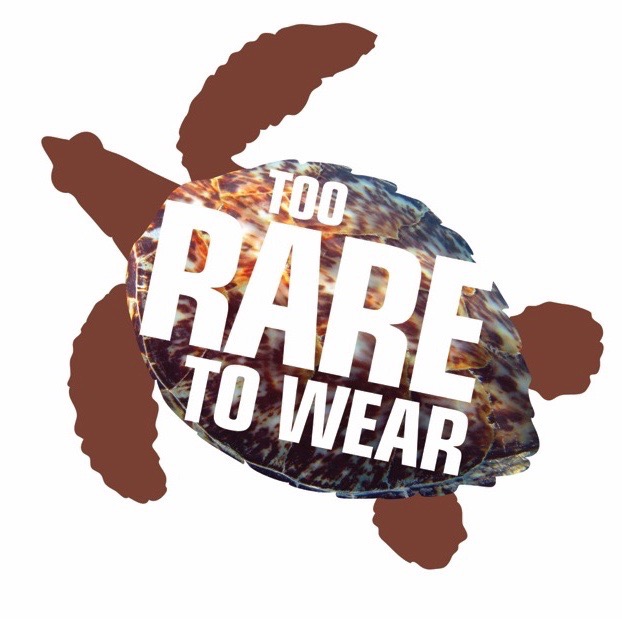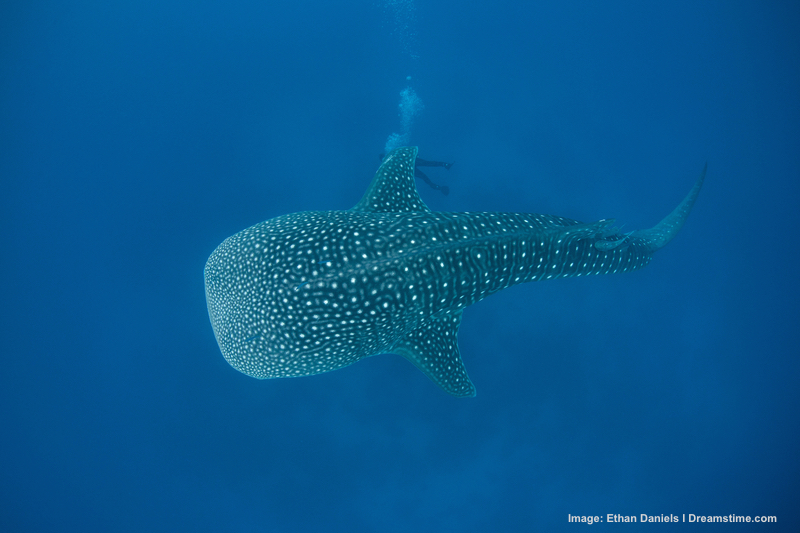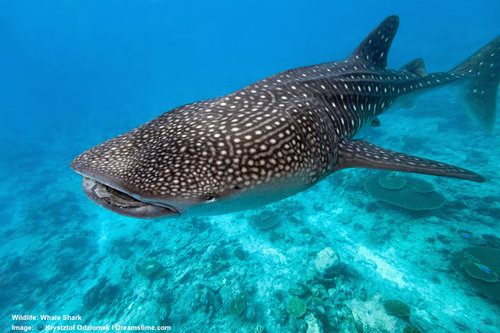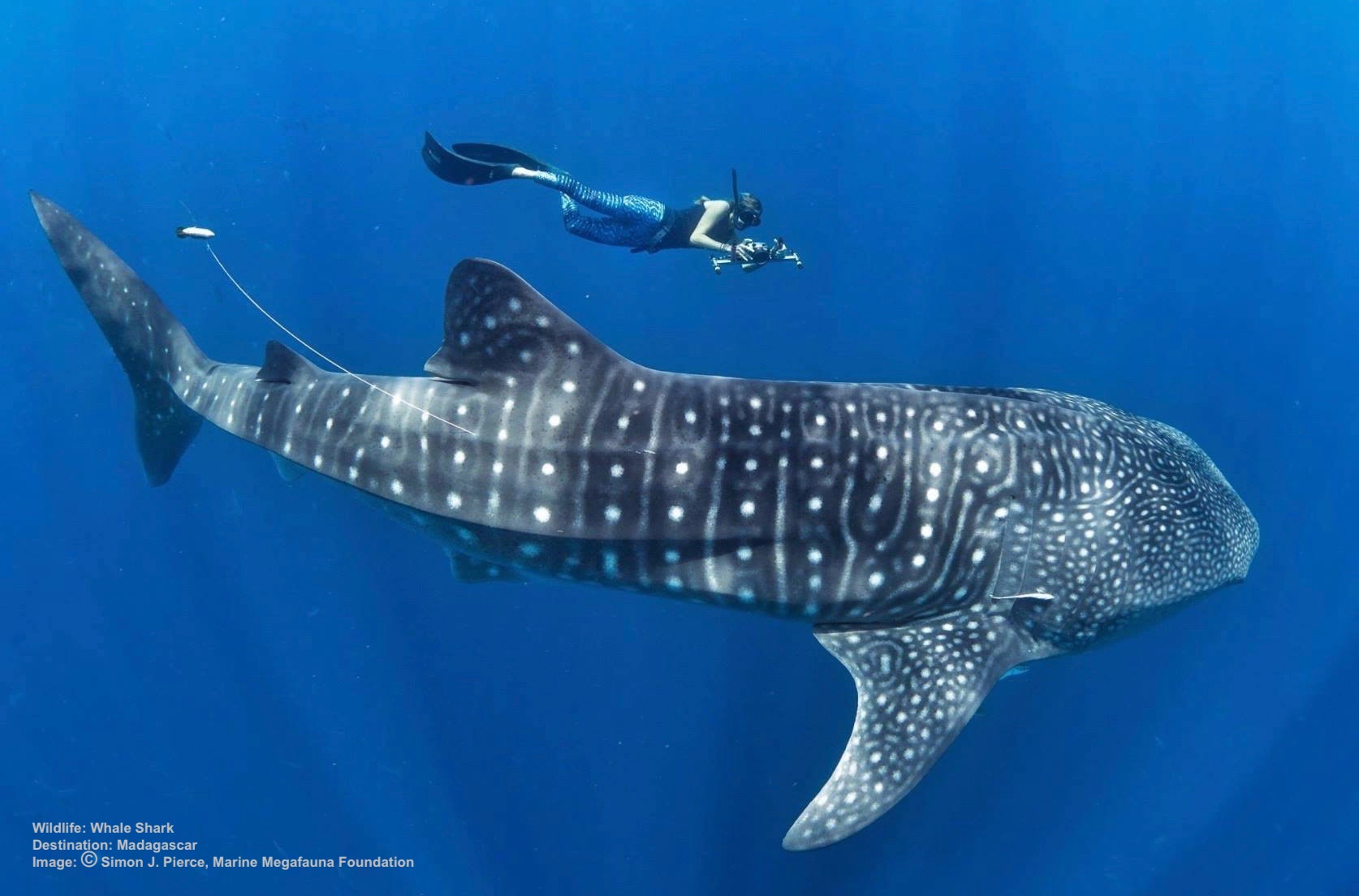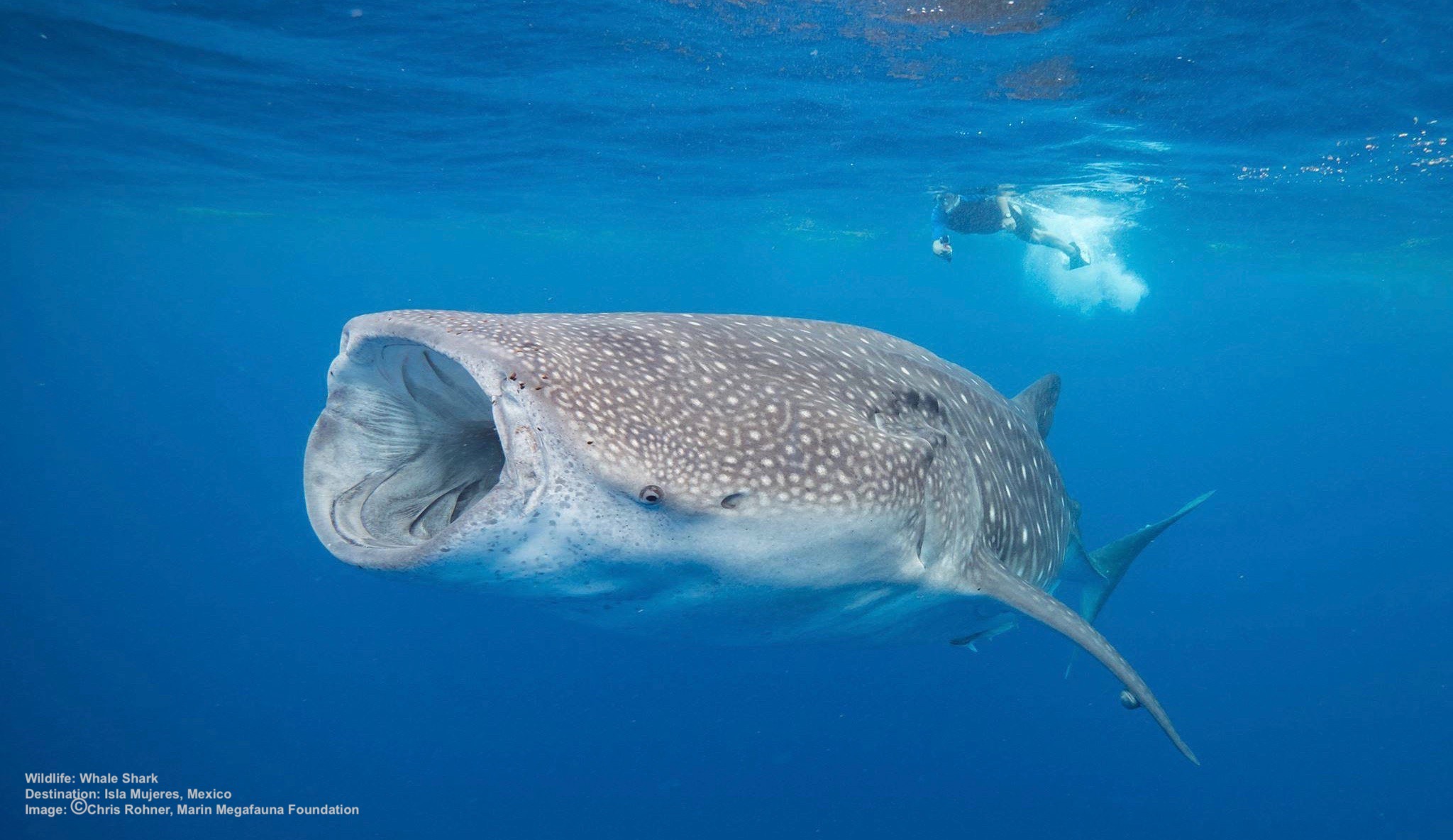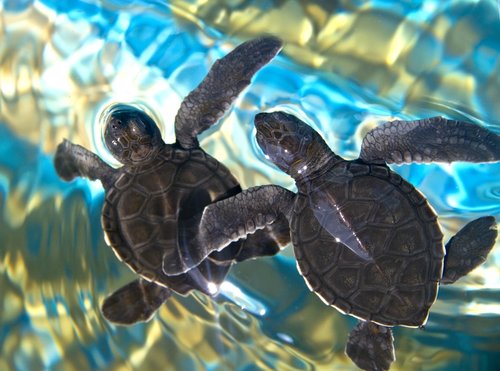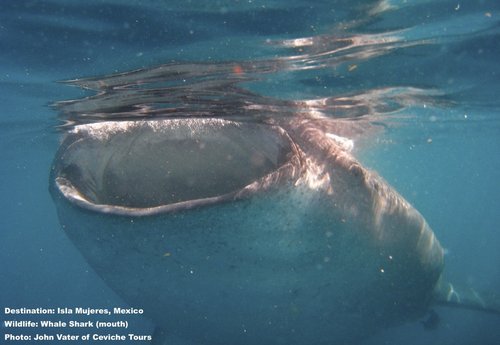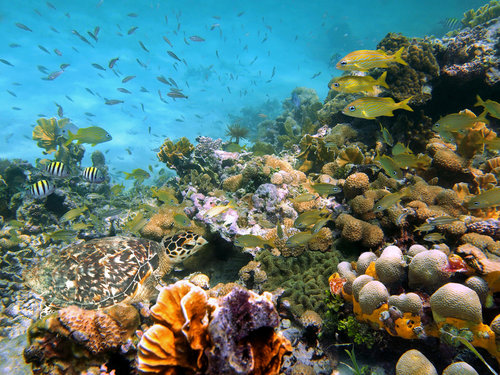All About Whale Shark Conservation
Whale Shark Field Guide - Chapter 2
WHALE SHARK CRUISING NINGALOO REEF OFF AUSTRALIA'S NORTH-WEST COAST. THE BIGGEST SHARK OF ALL EATS KRILL. THEIR CONSTANT MIGRATION IN SEARCH OF PLANKTON AND FISH SPAWN MEANS YOU MAY MEET UP WITH THIS GUY AGAIN, LIKE A FAVORITE MARINE TRAVEL BUDDY, IN WATERS OFF AFRICA OR THE PHILIPPINES OR ...©BLUEMEDIAEXMOUTH ⎮DREAMSTIME.COM
All About Whale Shark Conservation
The planet's biggest fish is in trouble.
Just as we are beginning to understand this gentle giant, they are disappearing. What is causing whale shark numbers to fade and how can we help them are multi-faceted questions that marine scientists are rushing to discover. The good news is that thousands of Citizen Scientists (you!) are contributing vital data to that is helping the researchers in their quests to help the whale shark survive.
IUCN Red List: Endangered and Decreasing (2021)
THE GLOBAL POPULATION OF WHALE SHARKS IS UNKNOWN, BUT THEY FACE A HOST OF EXISTENTIAL THREATS . IMAGE: JOHN VATER, CEVICHE TOURS, ISLA MUJERES, MEXICO.
How Many Whale Sharks are Left in the Wild?
The global population number for the whale shark is unknown. However, based new studies, evidence and reports from researchers at points along traditional whale shark migration routes, it is believed that the global shark population has decreased 50% since the 1980's. It is not known whether this overall decline in their population is due to alterations in migratory patterns, possibly caused by ocean temperature changes that affect their food sources. Look at the video below from the Marine Megafauna Foundation and Dr. Simon Pierce for an important overview on the declining worldwide whale shark population.
Whale Shark Conservation Notes
Our understanding of whale sharks is very limited, but a number of independent studies on-going around the world are adding to our knowledge base. What is certain is that collisions with boats, habitat degradation and even irresponsible tourism (touching and chasing) can drive whale sharks away from vital feeding (and possibly breeding) grounds. Sound pollution, from increased water traffic both commercial and private, adds to this problem.
REEFS, WHERE FISH GATHER TO SPAWN, ARE VITAL TO WHALE SHARKS AND OTHER MEGAFAUNA. RISING OCEAN TEMPERATURES DUE TO GLOBAL WARMING IS NEGATIVELY AFFECTING THE WORLD'S CORAL REEFS. IMAGE: THANKS TO BELIZE TOURISM BOARD.
Ocean Warming: Global warming is a major issue posing multi-layered concerns for marine scientists from back in 2011. Recent research shows an even worse prognosis. As the oceans warm, it is causing oxygen levels in the water to drop, negatively impacting marine life and changing behavioral patterns. Species that depend on very deep ocean dives for food are staying closer to the surface. Whale sharks are known to make these very deep dives.
Additionally, fish spawning patterns, krill levels, and the formation of plankton plumes, all of which the whale shark depends on for food, are affected by temperature changes. Each of these issues are contributing to changes in whale shark migration patterns and possibly negatively impacting population numbers.
Over Fishing: The problem of overfishing, is two-pronged. First, there is specific whale shark fishing. Their meat, oil, and fins were once highly sought after throughout Asia; global conservation pressure, combined with local education and economic realignment has decreased the demand for whale shark meat and parts to where it now remains centered, albeit mostly underground, in the Taiwanese market.
General commercial overfishing is a more complicated issue. Commercial overfishing in all of the world’s oceans is upsetting marine eco-systems and is a cause of coral reef decline. Marine mega-fauna, including the whale shark, as well as other marine life depend on the coral reefs. As reefs deteriorate so do marine life populations. The direct link between whale sharks and coral reefs was first studied at Ningaloo Reef, Australia in 1996.
The video below is courtesy of the Marine Megafauna Foundation.
Some Encouraging News for Whale Sharks
Over the last decade, the whale shark's enormous size couple with its gentle demeanor has made swimming with these giants a hugely popular tourist event. Visitor dollars are building marine tourism industries where once whales sharks were actively hunted - and over hunted. And help from citizen scientists - (you and me!) is adding to the world's understanding of these magnificent fish. Read on!
NINGALOO COAST IN WESTERN AUSTRALIA IS A UNESCO HERITAGE SITE FOR ITS BIODIVERSITY BOTH ON LAND AND IN THE SEA. IT IS ALSO THE HOME OF ECOCEAN, DEDICATED TO RESEARCHING WHALE SHARKS. IMAGE: ©BLUEMEDIAEXMOUTH⎮DREAMSTIME.COM
Wildlife Tourism Combined with Citizen Science is Helping
Whale Sharks
Science & Adventure: Additionally, whale shark research data is being accumulated faster and better than ever before. New research has helped lead to legal protection for the species in Australia, the Maldives, the Philippines, India, Mexico, Honduras, Thailand, Malaysia, Belize and the United States. Citizen Science, in the form of studies that encourage sport divers and other marine tourists to help gather data, is adding real information to our knowledge of whale sharks.
WILDBOOK FOR WHALE SHARKS TURNS A VACATION INTO CITIZEN SCIENCE ADVENTURE - AND IT IS FUN, TOO! IMAGE: JOHN VATER, CEVICHE TOURS, ISLA MUJERES, MEXICO.
Turn Vacation Pictures into Science: Wildbook for Whale Sharks
ECOCEAN at Ningaloo, is one of the longest (since 1994) continuously running whale shark studies on the planet. It was here that biologist and project leader, Brad Norman, and information architect, Jason Holmberg, developed the idea, procedure and software that would become the Wildlife Book for Whale Sharks. Researchers at ECOCEAN have identified over 800 whale shark individuals at Ningaloo and discovered that every year 2/3 of these sited are returning from a previous year - some are so familiar that, like old friends, they now have unofficial names.
Turn your vacation pictures into science! Programs like Wildme and its Wildbook for Whale Sharks photo identification library give an added and important dimension to a fun activity. Instead of just a Facebook post, a vacationer's images of whale sharks can become part of a world wide database used to identify and track the shark's migration, life cycle, and habitat. Greater understanding, plus added government protection, in conjunction with responsible tourism practices are creating a win for the whale shark, local communities on their routes, visitors, and the planet.
More Whale Shark Volunteer Opportunities
Some of the best marine life spots in the world also host non-government research facilities and community out-reach initiatives. Many offer interested laymen from around the world the possibility to spend some time assisting with local programs.
STUDIES ON WHALE SHARK MIGRATION USE BOTH TAGS AND PHOTOS TO IDENTIFY INDIVIDUALS IMAGE: THANKS TO JOHN VATER, CEVICHE TOURS, ISLA MUJERES, MEXICO.
Dr Simon Pierce, a leading marine biologist and whale shark researcher regularly takes volunteers with him on his research trips. As he says, these are journeys with a purpose.
The Maldives Whale Shark Research Program (MWSRP) encourages volunteers from around the world to come to visit and assist in data collection including photographing, identifying, and measuring whales sharks. Volunteers also participate in local educational programs and beach cleanups.
SLOW MOVING, DOCILE WHALE SHARKS WERE ONCE EXTENSIVELY HUNTED FOR THEIR MEAT, OIL, AND FINS IN MANY PARTS OF THE WORLD. TODAY, RESPONSIBLE WHALE SHARK TOURISM IS PROVING TO BRING SUSTAINABLE ECONOMIC BENEFIT TO MANY ONE-TIME FISHING COMMUNITIES. IMAGE: THANKS TO JOHN VATER, CEVICHE TOURS, ISLA MUJERES, MEXICO. Write here…
On December 24, 2013, the whale shark was included in Kenya’s new Wildlife Bill, which garnered the species protection in Kenyan waters. In Tanzania, Sea Sense, a marine conservation organization that engages local people as conservation ambassadors and data collectors, has implemented an education workshop for fishermen on Mafia Island where, off the island’s west coast, a small population of whale sharks congregate every year between October and April. The workshop involves promoting whale shark conservation and fishing practices that are sustainable and non-stressful to other marine life including whale sharks. Sea Sense has also established programs in local Mafia Island schools that teach students about the importance of the whale shark in their waters. Sea Sense also has programs with sea turtle hatchings!
And Then There is Just Plain Fun: Whale Shark Wildlife Tourism
Donsol Bay, Philippines and Isle of Mujeres, Mexico were formerly subsistence fishing / whale shark hunting communities, but both have turned to responsible marine tourism based economies instead. At Donsol Bay the World Wildlife Fund (WWF) stepped in and continues to help guide the community with innovative wildlife tourism initiatives. While at Isla Mujeres, Ceviche Tours, co-owned by an islander and a onetime tourist, is one of the leading local commercial businesses that combines neighborhood involvement, responsible marine wildlife experiences, and citizen science to preserve their nature and enhance community well being. See Chapter 3: The Best Places to See and Swim with Whale Sharks
Special Thanks!
Simon J. Pierce PhD : Co-founder and Principal Scientist for the Marine Megafauna Foundation (MMF) , Science advisor for Wildbook for Whale Sharks & Director of WildMe, Member IUCN Shark Specialist Group
Follow @Simonpierce See his marine photography. Follow @MarineMegafauna
John Vater Ceviche Tours, Isla Mujeres, Mexico. Follow Ceviche Tours @CevicheTours
Maldives Whale Shark Research Program (MWSRP) Follow @MWSRP
The Belize Tourism Board Follow @BelizeVacation Chabil Mar Resort, Placencia, Belize








